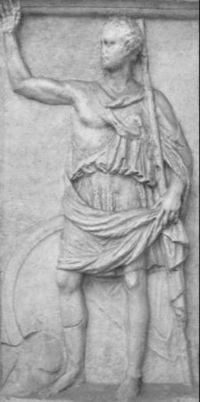Polybius

Polybius believed all democracies fail.
"The masses continue with an appetite for benefits and the habit of receiving them by way of a rule of force and violence. The people, having grown accustomed to feed at the expense of others and to depend for their livelihood on the property of others... institute the rule of violence; and now uniting their forces massacre, banish, and plunder, until they degenerate again into perfect savages and find once more a master and monarch."
Polybius was born around 200 BC in Arcadia. He was a Greek deported to Rome as a son of someone who opposed Roman rule in his own country, Macedonia.In Rome Lucius Aemilius Paulus employed him to tutor his two son. He eventually placed his allegiance with the Roman Republic.
He wrote The Histories which provided a detailed account of Rome's ascent as an empire. It included his eyewitness account of the Sack of Carthage in 146 BC by one of his former pupils.
He helped organize the new governments in Greece after their destruction.
He set the standards for honest historians influencing the historian like Sempronius Asellio.
Polybius was widely read by Romans and Greeks alike.
He is quoted extensively by Strabo explaining causes of events rather than just recounting events. He is mentioned by Cicero and Diodorus, Livy, Plutarch and Arrian. Montesquieu
Polybius gained a following in Italy, with men like Niccolò Machiavelli but also in French, German, Italian and English. His popularity among the learned public with such men as Isaac Casaubon, Jacques Auguste de Thou, William Camden, and Paolo Sarpi
Polybius' political thoughts inspired republican thinkers like Charles de Montesquieu and the Founding Fathers in America.
John Adams, considered him one of the most important teachers of constitutional theory.
Jose Ortega y Gasset calls Polybius "one of the few great minds that the turbid human species has managed to produce", and says the damage to the Histories is "without question one of the gravest losses that we have suffered in our Greco-Roman heritage".